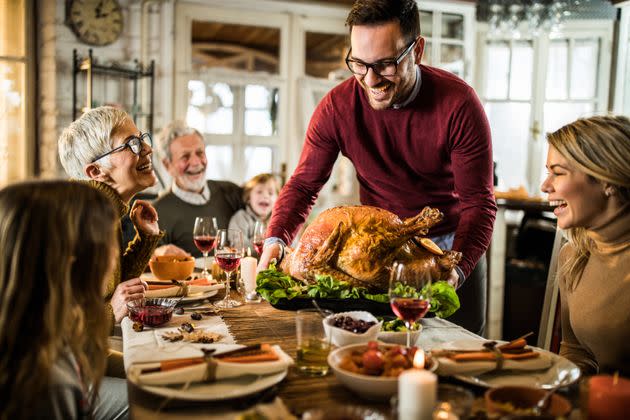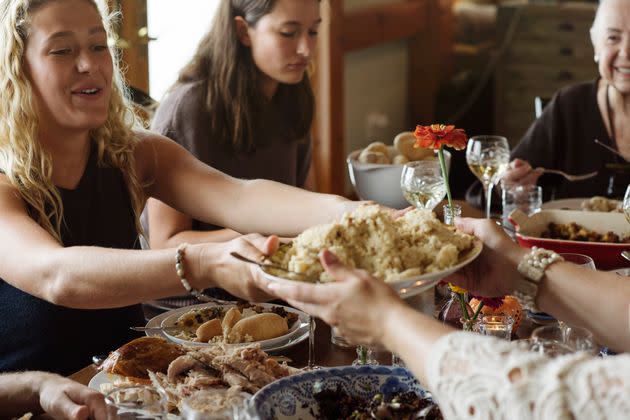The Rudest Things You Can Do During Thanksgiving Dinner
Thanksgiving brings loved ones together to unplug and share a special meal. This holiday is famously not always the most harmonious, however.
From cooking stress to tense conversations to full-on blowouts, many situations can derail a Thanksgiving dinner. But there are ways to keep things peaceful and light, as well. We asked etiquette experts to share some common rude behaviors at big holiday gatherings like Thanksgiving, and advice for avoiding them.
“Being together with family for holidays can be wonderful,” said Jodi R.R. Smith, president of Mannersmith Etiquette Consulting. “It can also be taxing. Taking the time to plan and think strategically can make the difference between enjoying the interactions and pure dread.”
Not RSVP-ing
Headcounts matter for a big meal like Thanksgiving, so make sure you let the host know you’re coming in advance.
“A holiday invitation of any kind should be sent out in advance, at least three to four weeks early,” said Diane Gottsman, an etiquette expert, author of “Modern Etiquette for a Better Life” and founder of The Protocol School of Texas. “And an RSVP should be sent back within the week it is received to give the host ample time to prepare.”
Even if you did RSVP for yourself, that doesn’t cover guests unless explicitly discussed, so avoid arriving with an uninvited plus one. There may not be enough seats, food or place settings to accommodate unexpected additions, so you put your host in a tough spot.
Ignoring The Schedule
“If you’re going over to someone else’s house for Thanksgiving festivities, make sure you know the schedule of events and plan accordingly,” Smith said. “Sometimes people invite you for noon and they’re not serving dinner until 4. Plan so there isn’t too much together time. Don’t be rude, but if you know that you’re walking into a difficult situation, it might be best to be acceptably late ― or leave on the early side.”
Respect the host’s planning for the meal and find out when you’re expected to arrive to eat as a group.
“If you are invited at 12 noon, don’t arrive early, but certainly don’t arrive late,” Gottsman said. “The host has the lunch carefully timed and it’s impolite to keep everyone waiting because you slept late.”

Bringing Dishes That Require Cooking
Thanksgiving hosts often invite guests to bring their own special dishes if they’d like certain foods included in the meal. But don’t assume this means you’ll have free rein over their kitchen.
“Unless explicitly cleared with the host in advance, don’t bring any food that requires you to use their stove or oven,” said Nick Leighton, an etiquette expert and co-host of the “Were You Raised by Wolves?” podcast. “The host is busy preparing the meal and definitely doesn’t have extra space in the oven or on the stove for you.”
Starting Tense Conversations
“Family and friends all put together in one spot like this often means a clash in personalities, religious beliefs, politics and unsolicited opinions on every subject,” said August Abbott, an etiquette expert with JustAnswer. “The usual rule to insist on no discussions of religion or politics is hard to enforce, but enforce it you must. Even if everyone is of the same political preference, just talking about ‘the other side’ raises blood pressures and angst. This is not what the day is about.”
If you want to avoid a blowout, focus on keeping the peace by fostering a light, harmonious environment and committing yourself to kindness.
“Changing someone’s perspective at the Thanksgiving table rarely happens,” Smith noted. “Understand that there is a time and place for everything.”
Of course, there are indirect ways to make your opinion known without stoking tensions.
“Do not encourage, laugh or agree with something you find reprehensible,” Smith said. “A prolonged look before a topic change can speak volumes. Excusing yourself from the table to ‘visit’ the restroom and text a friend can help to keep you sane.”
Prying Into People’s Personal Business
“Don’t give parenting advice or correct someone else’s children or ask awkward questions such as ‘Why aren’t you married?’ or ‘Are you going to have kids?’” Gottsman advised.
Consider engaging in a bit of what Smith calls “preemptive etiquette” ahead of Thanksgiving to keep yourself calm on the day.
“That means, go into the meal with topics of conversation already prepared,” she explained. “If your aunt just returned from a trip to Greece, ask her about it. Besides travel, other ‘safe’ topics include musical events, bestselling books, food, sports and holiday memories.”
Feel free to deflect if you feel targeted. Not every question needs a response.
“You do not owe anyone an answer regarding your weight, your romantic status or your politics,” Smith said. “Know your triggers and strategize in advance. If you are single, you know relatives are going to ask about a significant other. Have a stock answer ready to respond and move the conversation along ― ‘Oh, Aunt Tilly, you know I love to play the field. Hey, did you hear about my latest trip? I am just back from Prague. You would not believe what I saw.’”

Asserting Yourself In The Kitchen Without Being Asked
“Refrain from giving the host advice on how to season the food,” Gottsman urged.
The host is preparing the meal, so let them take charge. And if you’re hosting Thanksgiving this year, try to be gracious if this situation arises.
“We’ve all had those guests who won’t leave the kitchen and won’t stop telling you how wrong you’re doing pretty much everything with the food,” Abbott said. “Actually invite them to taste and give their opinions. When they’re done, thank them and usher them back out of the kitchen with the promise you’ll tend to their suggestions.”
If they persist, she advised politely suggesting you’d love to attend Thanksgiving at their house next year.
Not Letting The Host Know About An Allergy Or Dietary Restriction
Don’t just assume the host knows about all of your dietary requirements.
“If you are allergic to a particular food, let the host know in advance,” Gottsman said. “Offer to bring a casserole you can share with fellow guests. The host may or may not take you up on your offer, but at least you have offered.”
Whatever you do, don’t throw a fit if they won’t accommodate your needs.
“If you know the host is not going to be respectful of your dietary restrictions, eat in advance so you are not starving and bring something you know you can eat as a side dish to share,” Smith said.
Only Talking To People You Know
“Make conversation with new people,” Gottsman said. “If there are dinner guests you aren’t familiar with, make it a point to speak to them and get to know them rather than sticking to those you see and speak to every day. It’s polite to mix and mingle with new friends.”
Chatting with the other guests is not only polite behavior, but it also gives you a chance to get away from certain relatives who grate on you over time. Be strategic about those interactions as well.
“If prolonged stretches of time with your mother-in-law makes you crazy, find out what time the meal begins and arrive just prior,” Smith suggested. “Or, if you are staying overnight, take a long walk in the afternoon to give yourself a breather.”

Showing Up Empty-Handed
One of the simplest gestures of courtesy and gratitude for a guest is giving your host a small present.
“Bring an activity as a hostess gift,” Smith suggested. “It could be a board game, a movie, anything to help structure the unstructured time. If you’re together for more than just the meal, plan for an activity.”
She offered ideas like starting a family game of flag football outside or taking a group walk around the neighborhood. Continue to show your appreciation after the event as well.
“Don’t forget to send your host a thank-you note,” Leighton said. “The only thing better than being invited to Thanksgiving dinner is being invited back.”
Assuming You Can Take Home The Leftovers
Thanksgiving leftovers are a highlight of late November, but the host who prepared the meal has every right to keep the remaining food in their house.
“Don’t ask for a doggie bag if one is not offered,” Gottsman said.
“Wait to be invited by the host before loading up your Tupperware with all the leftovers,” Leighton echoed.
Hanging Around Too Long After Dinner
“Don’t overstay your welcome,” Leighton urged.
Look out for hints that the evening is wrapping up and your hosts would like you to leave.
“At the point when the hosts of changed into their pajamas, that’s usually a good hint that it’s time to go,” he joked.
You don’t necessarily have to let it get to the pajamas point, either. Pay attention to what others are doing and perhaps suggest continuing the festivities at your place or a nearby bar if you don’t want the night to end.
“While you don’t want to be the first to bolt out the door, you certainly don’t want to be the last straggler that won’t leave,” Gottsman added. “When people start to retrieve their coats and walk towards the door, do the same.”

